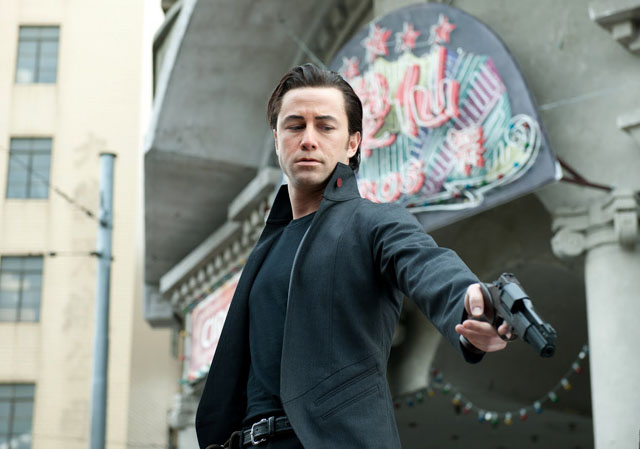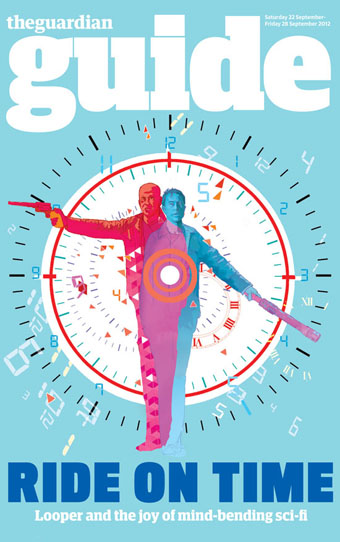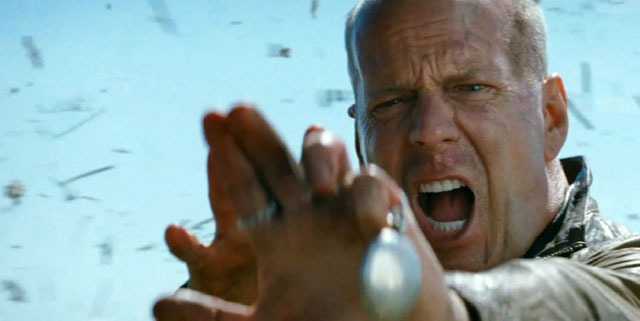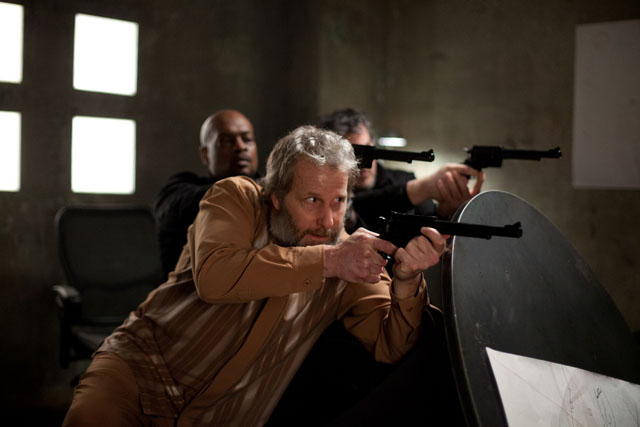Looks like Toronto‘s opening with a bang, so let’s get right to it, beginning with John Semley in Cinema Scope: “That there is simply so much going on in Looper—Time travel! Telekinesis! Hover-bikes! Vagrant raids!—is one of the film’s great strengths. Rian Johnson’s futuristic neo-retro-noir is entirely overstuffed, and yet never to a fault; it crackles with energy of a filmmaker giddily playing with all his live ideas, his goofy enthusiasm inflecting even the film’s more sullen, serious passages.”
Pitting “a ruthless hit man (Joseph Gordon-Levitt) against his future self (Bruce Willis), Looper marks a huge leap forward for Rian Johnson (Brick),” writes Peter Debruge in Variety. “His grandly conceived, impressively mounted third feature shows a giddy, geeky interest in science-fiction, then forces it into the back seat and lets the multidimensional characters drive. In a genre infamous for loose ends, this thinking man’s thriller marshals action, romance and a dose of very dark comedy toward a stunning payoff.”
“Probably the shakiest aspect of Johnson’s original screenplay is what it asks the viewer to buy about the future,” finds the Hollywood Reporter‘s Todd McCarthy. “A mere 62 years from now, in 2074, time travel has become possible, but such a momentous breakthrough is limited to serving as a body disposal system…. But the premise is established in nifty fashion; the doomed, hooded with hands bound behind them, suddenly materialize in an empty field and the looper immediately blows him away with his Blunderbuss.” This “story about a man assigned to kill the 30-years-older version of himself” makes for “a clever, entertaining science-fiction thriller that neatly blurs the line between suicide and murder.”
“Like Joss Whedon,” suggests Anne Thompson, “Johnson is a gifted writer with an instinct for amusing us; he tells us what we need to know, sets up his characters, delivers witty and entertaining dialogue, and actually surprises us in the third act with a twisty mind-bending denouement that turns the movie from a straight-ahead sci-fi entertainment into something deeper.”
Screen‘s review is so fresh it hasn’t got a byline yet: “Breezily freewheeling, visually stunning and impressively complex, Looper is brimming with ideas, action and heart as well as having the star power to click with audiences.” Joseph Gordon-Levitt “proved he could carry the gun in Inception, but here he gets gun-battles and fist-fights with veteran action star Bruce Willis and more than holds his own.
“The less you know going in, the better,” advises FirstShowing‘s Alex Billington, “because it just gets better as the story goes on.”
Interviews with Johnson: Jay A. Fernandez (indieWIRE), Todd Gilchrist (Movies.com), and Glenn Whipp (Los Angeles Times).
Having opened this year’s Toronto International Film Festival, Looper is, of course, a Gala Presentation.
Updates: “Looper is more than just a stylish genre exercise,” writes Drew McWeeney; “it is a moral argument wrapped up in a blockbuster’s skin, a profound film that will engage audiences on many levels, and that will reward repeat exploration.”
It’s “the coolest, most-confident sci-fi flick since 2006’s Children of Men,” argues Amy Nicholson at Box Office.
The Playlist‘s Kevin Jagernauth agrees that Looper “may be one of the most original pieces of sci-fi to come down the pike in quite a while.”
“Looper may boast the star-heavy cast and commercial appeal typical of so much TIFF fare,” writes Jason Anderson in his overview of the festival lineup, “but it also reconfigures elements of [Chris] Marker’s La Jetée (1962) with the same ingenuity as Terry Gilliam’s 12 Monkeys (1995), a touchstone that Johnson acknowledges by casting Bruce Willis in his movie too.”
“The first hour displays a brilliant elaboration on the noir antics demonstrated in Brick, but the movie’s later scenes stumble in a mass of half-formed ideas,” finds indieWIRE‘s Eric Kohn. “Nevertheless, craftsmanship holds Looper together during its concluding moments so that the skill behind the camera remains in focus, resulting in an experience nearly as fragmented as the time-traveling antics at its center.”
Looper is “the best sci-fi movie of the year so far,” declares Erik Davis at Movies.com.
Entertainment Weekly‘s Adam B. Vary talks with Emily Blunt about “why she leapt at the chance to be in the film; the unusual training regimen she took on for the part; why she called Looper ‘the best movie I’ve ever been a part of’; and what it’s like to be directed by Johnson.”
Updates, 9/9: First, you should know that the press conference in the video above begins at around 17’45”.
“Johnson has novel conceits stuffed right up to his elbows,” writes the Telegraph‘s Tim Robey, “but they don’t always feel organic to the story, and there’s a growing whiff of illogical balderdash to his whole plot: it’s as if the script was started by Christopher Nolan and completed in hair-pulling fits and starts by M. Night Shyamalan.”
But “the world of the movie has been carefully planned,” writes the AV Club‘s Noel Murray. “Johnson doesn’t just throw in cultural, societal or fashion trends into the movie for weirdness’ sake; he makes the characters’ retro clothing central to the movie’s ‘everything recurs’ theme, and he works the existence of telekinesis and roving vagrant mobs subtly into the background of the action, so that he can bring those elements back as needed. Looper is reminiscent of The Matrix—not in style or plot, but in the sense of being fully realized.” He gives it an A-, while, for Scott Tobias, it’s a B+.
“Looper is an exercise in world building par excellence, a film that is completely engrossing and rewarding on its own terms,” adds Todd Brown in a review that may tell you a bit more than you want to know at this point. But this is safe: “What time travel gives Johnson here is not a logical puzzle box to unravel but the chance to have a young man face his older self and learn from his own mistakes…. It allows Johnson to completely reframe the heroes journey in a way that we’ve never quite seen before.”
Also at Twitch, Kurt Halfyard: “Looper is perhaps the best piece of time-travel brainfood since Primer. It is notable that that film’s writer/director, Shane Carruth, offered his services as some sort of Time-Travel Consultant (a good job if you can get it!). Looper has the money and wherewithal for big action set-pieces, loads of interesting gadgetry and an off-the-wall penchant for wardrobe choices, but it ends up being a surprisingly effective character piece; even a showcase for its actors. It is also really quite funny in how it tips its hand in terms of an awareness of the limitations of the genre, even as it charges right ahead at demonstrating there is still room for expansion.”
“And Johnson has fun, too,” blogs the Boston Phoenix‘s Peter Keough. “Not just with the philosophical baggage implicit in the notion of time travel, but also in the world of cinema allusions he can connect with. Without seeming derivative, Looper playfully touches on other movies of this kind, starting obviously with 12 Monkeys and Chris Marker’s La Jetée and including The Terminator (the main female character’s name is Sara), Memento, Angel Heart, among many others. Not to mention echoes of generations of noirs and gangster movies.”
“For all its promise, Looper is a true film of two parts,” finds Daniel Green at CineVue, “with the second, ultimately, a jumbled genre-clash of misfires and missteps. After the disappointment of Ridley Scott’s patchy Prometheus, it would appear that we’re still waiting on 2012’s first great American sci-fi.”
Some may consider Henry Barnes‘s review for the Guardian a little spoilerish, but you might want to know he gives Looper four out of five stars.
For indieWIRE, Nigel M. Smith talks with Gordon-Levitt about “the challenges associated with playing a younger Willis (he dons a prosthetic nose to resemble to Die Hard star in the film), and going behind the camera for the first time.” Gordon-Levitt is currently editing his directorial debut, “a story that’s not just about porn.”
Updates, 9/15: Roger Ebert finds Looper “strangely effective”; Time Out New York‘s David Fear interviews Johnson, who tells him that he and Gordon-Levitt are “both into the idea of making movies that are both smart and fun. When I first started telling Joe about Looper, I told him, look, I don’t want to make a dirge here. There’s some complicated, heavy stuff going on, but I want this to be a ride.”
Updates, 9/23: Interviews with Johnson: Henry Barnes (Guardian) and Bryan Bishop (Verge).
And Johnson‘s tumbling photos from Toronto.
Updates, 9/26: “Not only is the smart, sexy, sophisticated but still slam-bang sci-fi action-thriller not dead, it’s just gotten itself a potent shot in the arm by way of writer-director Rian Johnson,” writes Glenn Kenny at MSN Movies. “The creator of the formally ambitious indie noir variant Brick and the ornate New Wave con-artist sort-of farce The Brothers Bloom demonstrated imagination and chops galore with those pictures, but his new picture, Looper, still feels kind of like an out-of-nowhere head-butt.”
Looper is full of “the stuff that routinely calcifies one’s cynicism toward pop filmmaking,” writes Chris Cabin in Slant, “but Johnson sets these facets into motion with such a deft and intricate sense of storytelling, such a bold, robust emotional palette, that one is rather reminded of what made these tiresome tropes so successful in the first place.”
“If the ending seems a little too hedge-betting, Looper nonetheless satisfies wholly on the level of dramatic necessity,” writes Andrew Schenker in the Voice. “Thrilling in its deft juggling of complex narrative elements, utterly clear in its presentation, and unfolding with what feels like serious moral purpose, Looper still can’t help but suggest that its larger ambitions are something of a put-on, a nice thematic polish to set off its interpersonal drama. But there’s no shame in a film that favors the human scale over abstract philosophizing or meta-cinematic frippery. For Johnson, the inveterate pasticheur, it qualifies as a significant step forward.”
For Alison Willmore, writing at Movieline, “despite the fleet-footed flash of its storytelling, what’s most impressive about Johnson’s movie is its dark-edged faith in people being able to change despite the path on which they’ve been set. If all we’ll ever be is a product of the circumstances in which we grew up, then time travel’s almost unnecessary—the future’s predetermined. It’s choosing something new that may be as clear a sign as we ever get of a soul.”
For the New York Times Magazine, Adam Sternbergh asks Johnson about his inspirations. “[H]e started with a little Haruki Murakami. Then Macbeth—which is, he points out, a kind of time-travel story itself, insofar as the main character is told, right at the start, what the future holds, and that knowledge affects all his subsequent actions, ‘right up to the fact that Macbeth does all these horrible things to retain this vision of what the future could be,’ Johnson says. Another touchstone: Four Quartets, by T. S. Eliot.” Sternbergh asks him about “the bar where the loopers assemble, called La Belle Aurore. A name like that can’t be an accident, and Johnson laughed when I asked about it, as though he’d been caught. ‘It’s a Casablanca reference,’ he said. ‘If you take a close look at Joe’s narrative arc, I totally just stole Rick’s arc from Casablanca. So I named my bar after the bar they’re at in Paris when the Germans are attacking. I figured I owed that movie something.'”
More interviews with Johnson: Stephanie Abrahams (Time), Matt Bochenski (Little White Lies), Kyle Buchanan (Vulture), Canfield (Twitch), Ben Kenigsberg (Time Out Chicago), Peter Keough (Phoenix), Ray Pride (Newcity Film), Tasha Robinson (AV Club), Nigel Smith (Film.com), and Jen Yamato (Movieline). And with Gordon-Levitt: Stephanie Abrahams (Time) and Kyle Buchanan (Vulture).
Updates, 9/27: “In many ways—all of them good—Looper is a movie with a split personality,” argues Mike D’Angelo in the Nashville Scene. “Like its ‘hero,’ its narrative is divided in two, with the hard-charging dystopian nightmare of the first half giving way to a more leisurely and idyllic (yet still tense) domestic drama. And while it’s uncommonly crafty and bold by Hollywood standards, it’s also uncommonly exciting and fun by brainy-art-film standards. Johnson has an intuitive understanding of cinematic rhythm combined with a showman’s brash enthusiasm; his movies pop and weave and sizzle and amble, whatever’s required. He’s looking to wow you, but always in the service of characters and ideas, not just as sensation for its own sake…. Looper is designed rather than assembled, and that alone makes it a welcome anomaly in today’s multiplex. That it also tells a compelling story and has something uniquely thought-provoking to say makes it indispensable.”
“Here’s what’s so awesome about Looper,” writes Noel Murray at the AV Club: “It’s a futuristic time-travel movie in which more or less the entire last hour takes place on a farm. And that’s just one of the many ways writer-director Rian Johnson subverts expectations. This is a ‘you know what would be cool?’ movie that considers the real-world ramifications of its science-fiction whiz-bang, and a film of ideas that doesn’t skimp on the action. Most of all, Looper asks questions about whether a man’s destiny is locked into place—not because the future has already been written, but because of the kind of person he is.”
“If you’ve ever complained about Hollywood’s lack of originality, especially as it pertains to genre movies, you owe it to your past self to go see Looper once or, preferably, twice,” advises Paul Constant in the Stranger.
But for the Philadelphia Weekly‘s Sean Burns, “Looper is a neat little movie that leaves you with the nagging feeling it could have been so much more. Gordon-Levitt and Willis are only onscreen together for a handful of moments, which is too bad because those scenes provide an emotional hook for the entire picture.”
“The actors are separated by more than age,” notes Time‘s Richard Corliss: “they represent different views of the movie male, now or 30 to 60 years in the future. They’re so different, in fact, that those watching Looper may wish to see a movie covering the three intervening decades that turned the young, cocky but essentially soft Joe into the haunted hard case who would risk his life and kill hundreds, including a few children, to revive the woman he loved. That could be a splendid sequel to the fascinating—if not quite fabulous—double-helix Looper.”
The Guardian‘s Peter Bradshaw senses a “mutant strangeness that pervades the movie. It’s different from the comedy in Robert Zemeckis’s Back to the Future (1985) and the deadpan science in Shane Carruth’s cult indie Primer (2004). There is violence and fear: criminals have corrupted the very tenets of space and time.”
New York‘s David Edelstein: “Looper is all over the place—a series of barely aligned loop-de-loops—but if high-toned futuristic time-travel pictures with a splash of romance float your boat the way they do mine, you’ll have yourself a time. The climax is tumultuous, the payoff happy and sad in the right measure. The future might be ghastly, but heroism lives.”
Matt Bochenski at Little White Lies: “This is so nearly the kind of movie that killed Richard Kelly’s career: millennial, garish and uncompromising to a fault. But it swaggers around with such confidence that it succeeds through sheer force of personality.”
“So few dystopian setups dodge the derivative, and Johnson’s isn’t perfect, but Looper, worth it for the action bones alone, is more clever than anything in this year’s sci-fi class,” writes Drew Lazor in the Philadelphia City Paper.
Updates, 9/28: “There’s a lot to get past,” writes Manohla Dargis in the NYT, “including an antediluvian divide between hard-charging men and decorative dames, including a stripper, Suzie (Piper Perabo)… Things, or rather the gender politics, improve once Joe, fleeing the outfit—with his older self nearby—takes refuge at a farmhouse belonging to Sara (an appealing Emily Blunt), a single mom with a strange little boy, Cid (an excellent Pierce Gagnon). There, Mr. Johnson settles into something deeper, swaps the banter for real feelings and wins you over.”
A bit on the milieu from Salon‘s Andrew O’Hehir: “No one in the movie ever discusses how America has changed between now and 2044, the present of Looper, but certain things are obvious: Fossil fuels appear to be scarce to nonexistent; most of the cars we see are 2000s clunkers retrofitted with solar panels. Technology has continued to miniaturize and develop, but class divisions have only gotten worse. The unnamed American metropolis (possibly Kansas City) where the main action takes place has an impressive skyline, but its streets are a John Carpenter zone of wreckage and chaos, where might makes right…. I’m not ready to proclaim Looper a sci-fi masterpiece just yet; let’s let it sit awhile. But it’s a lean, mean, smart, violent picture with a bit of Stanley Kubrick edge, fueled by the terrific Gordon-Levitt, who simultaneously plays a guy whose confident worldview is falling apart and does the most uncanny impression of Bruce Willis you’ve ever seen.”
“Gordon-Levitt was already a rising actor, having been singled out by critics in less-mainstream roles, like the gay drifter he played in Gregg Araki’s moody, unforgettable Mysterious Skin,” writes Slate‘s Dana Stevens. “But it was only after Brick that he began his steady rise toward household-name status, playing a lovelorn greeting-card designer in (500) Days of Summer, a brain-cancer patient in 50/50, and a credible action sidekick in both Inception and The Dark Knight Rises. I’m an avowed JGL fan, so the prospect of Gordon-Levitt and Johnson working together again was enticing.” Well: “Looper felt to me like a maddening near-miss: It posits an impossible but fascinating-to-imagine relationship—a face-to-face encounter between one’s present and future self, in which each self must account for its betrayal of the other—and then throws away nearly all the dramatic potential that relationship offers. If someone remakes Looper as the movie it could have been in, say, 30 years, will someone from the future please FedEx it back to me?”
“Imagine if Terminator spent its entire second half at that motel hideout, and you’re close to understanding how Looper, for all its inventive twists and turns, falls short of greatness,” adds A.A. Dowd in Time Out Chicago.
“Johnson has a great movie in him, and he keeps getting closer, but he’s not there yet,” agrees the Boston Globe‘s Ty Burr.
But Roger Ebert and his readers both give Looper a score of 3.5 out 4: “The key is in [Johnson’s] writing. Looper weaves between past and present in a way that gives Johnson and his actors opportunities to create a surprisingly involving narrative.” Same score from the Herald‘s Robert Horton: “Every time you think it’s going to take the easy way out and settle for something conventional, it throws a curve.”
“Looper won me over,” writes Ed Champion, “despite a frustratingly paradoxical finale that contradicts two hours of story logic. Here is a film that isn’t just interested in entertaining, although I must confess that I was thrilled by one late scene in which Bruce Willis blew away a considerable number of baddies…. Much as the underrated Daybreakers took care in establishing a consequential world (complete with homeless vampires holding cardboard signs which read STARVING NEED BLOOD), Looper is smart enough to understand that a good time travel movie is all about the peripheral deets.”
For Time Out London‘s Tom Huddleston, “if Johnson’s main aim was to strike a balance between conceptual cleverness and multiplex thrills, he could hardly have done better.” More from Robbie Collin (Telegraph, 4/5) and Anthony Quinn (Independent, 3/5).
Update, 9/30: “With both its urban and rural-cornfield milieus marked by consuming bleakness, Looper harkens back to both Blade Runner and The Killers while nonetheless crafting its own unique spin on noir fatalism,” writes Nick Schager.
Updates, 10/2: “[W]hat surprised—and delighted—me most about Looper was its willingness to wander and explore; the sharp right turns in its plotting that sent this neo-noir veering off in new directions.” For Time, Steven James Snyder dives in, but first: “WARNING: Major, comprehensive spoilers ahead.”
From the Film Doctor: “10 Notes on Looper, Schopenhauer, and Reciprocal Nature of Violence.”
Deadline‘s Nikki Finke‘s reporting that, on its opening weekend, Looper may pull in more f








